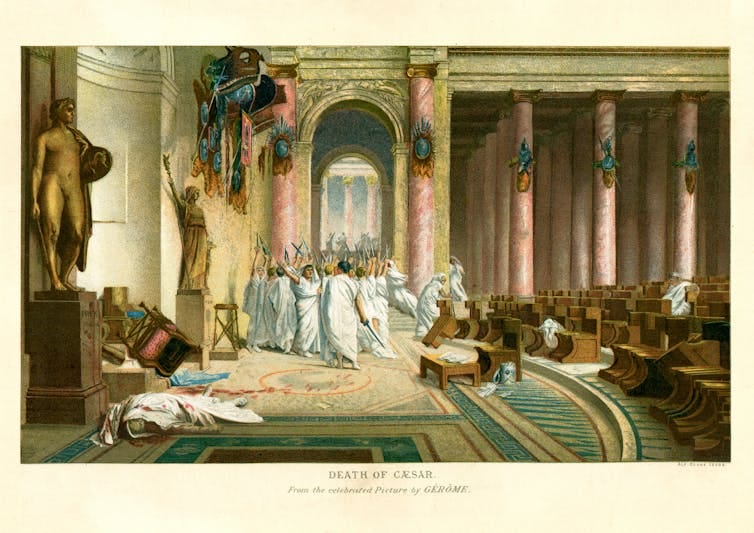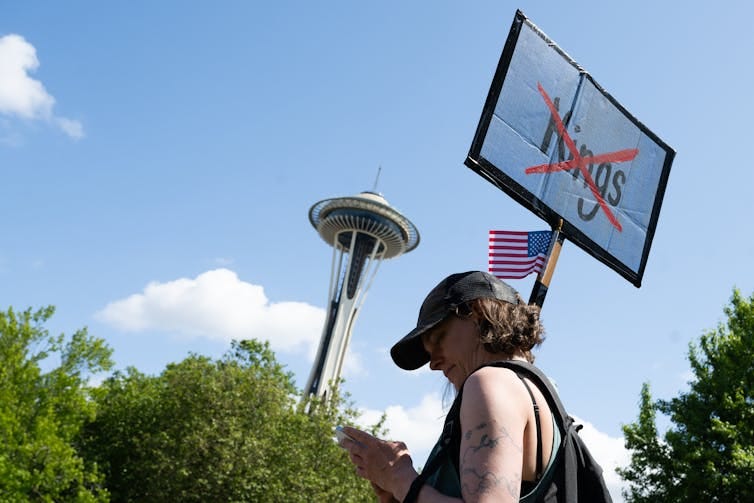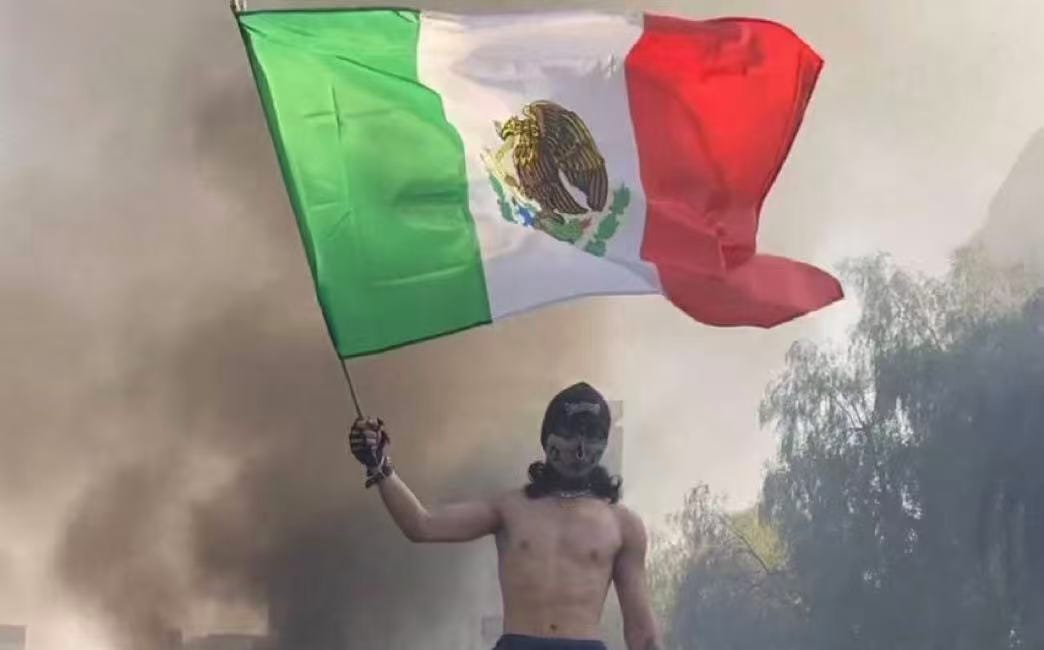NO KINGS - Sic semper tyrannis!
Protests have spread to multiple cities, San Francisco, Houston, Chicago, New York. These are some of the most visible protests against Trump's policies.
Featured contributor Prof. Josef Mahoney joined CGTN to discuss the political protests in the US.
A long hit, additional questions and responses and link in the comments section below.
This "no kings" protests has spread to multiple cities, San Francisco, Houston, Chicago and New York. And this is one of the most visible protests against Trump's policies. Give a sense of where the US stands right now.
The overall situation appears increasingly chaotic. Trump holding a major military parade in Washington on his birthday, which coincides with the birthday of the Army, appears both royalist and militarist to many of his critics, conveying a hostile symbolism to those who oppose his deployment of troops in LA, his aggressive tactics against migrants, his trillion dollar defense budget, his impugning the sovereignty of Canada and Greenland, and what many suspect is his support for Israel’s attacks on Iran and the strong possibility he’ll let the US to be drawn into that conflict more directly.
Meanwhile Minnesota faced the politically-motivated assassination and attempted assassination of two of their leaders, both Democrats, by a suspect registered as a Republican, who had a list of other Democrats he planned to kill.
The 2000+ protests nationwide against Trump and his policies have competed with these other developments and perhaps seen their message diluted, keeping in mind that their message, rejecting “authoritarianism, billionaire-first politics, and the militarisation of democracy,” already is rather abstract instead of focusing more narrowly on a single issue, like attacks on migrants, support for hashtag#israel, and so on, which are real sources of immediate duress and injustice. But such issues are too divisive to draw large, unified responses, and thus, the messaging was already watered down. But it’s possible all of these issues will intersect and inspire more to take to the streets, including counter-protesters.
Protesters accuse Trump of being authoritarian, do you think this claim is solid given Trump's immigration policies?
Trump’s immigration policies are heavy-handed, but the majority of Americans still appear to support him on this issue and elected him on this issue, so even if it’s authoritarian, it arguably reflects the democratic will of most voters.
Stronger accusations of authoritarianism are strongest are found in his rule by executive order, which is truly excessive compared to his predecessors, despite the fact that his party controls both the House and Senate.
Furthermore, Trump’s mobilisation of the National Guard and deployment of Marines in LA, combined with his attacks on universities and the federal government, in tandem with the increasing perception that the US today has more in common with an oligarchy than democracy, along with MAGA unilateralism globally, these also can be interpreted as examples of increasing #authoritarianism.
https://www.cgtnnow.com
Comments:
We need to keep in mind that what we’ve seen are weekend protests. Most people will have to go to work on Monday. While we might see some continued protests and unrest to follow, these are likely to be small. Perhaps we’ll see more unrest next weekend.
Finally, it’s possible the White House might also want to see how the Courts rule on Trump federalizing the California National Guard. We might well assume that order will be re-established in LA, on the backs of local police, but Trump will take credit for it. And even if the courts ultimately rule against him, he’ll still claim victory, but without having exposed himself in other locations that would then necessitate a retreat. But if the courts ultimately give him a freer hand, then people should fear additional troop deployments and the sort of provocative acts like ICE raids in sensitive areas that serve a triggers for local unrest. Plus, we should anticipate the drama of SWAT teams as you've pointed out, but these are presently too small to assert real power on a national scale, and perhaps even on a local scale.
Could the nationwide protests make or break Democratic careers or shape future elections?
I don’t think we can say that Democrats have turned a corner yet politically. Many voters are still disillusioned with the party, and their growing distaste for Republicans does not yet seem to favour Democrats.
This is the political milieu that Elon Musk is now trying to exploit, essentially that the two-party system is broken, that both parties are incapable of ruling responsibly, and perhaps a new party needs to be established.
That said, the political killings in Minnesota, the current unrest and potential for new unrest, these do offer Democrats an opportunity to mobilize and reconnect with voters. However, many of those who are protesting are probably more radical and disaffected than traditional Democrats can abide. Nevertheless, US politics is in a fraught position presently and the future for everyone is uncertain. For example, which party might win the mid-term elections? We have no idea presently.
Liberate Los Angeles
Featured contributor Prof Josef Mahoney joined CGTN The Hub with Wang Guan and fellow panelists Andy Mok and John Gong to discuss the ongoing military deployments in California.
‘No kings!’: like the LA protesters, the early Romans hated kings, too
By Peter Edwell (The conversation)
Protesters across the United States have brandished placards declaring “no kings!” in recent days, keen to send a message one-man rule is not acceptable.
The defeat of the forces of King George III in the United States’ revolutionary war of 1775–83 saw the end of royal rule in the US. Touting itself as the world’s leading democracy, kings have not been welcome in America for 250 years. But for many, Donald Trump is increasingly behaving as one and now is the time to stop him.
Having studied ancient Roman politics for years, America’s rejection of kingship reminds me vividly of the strong aversion to it in the Roman republic.
Early Romans too, sought a society with “no kings!” – up until, that is, the period following the assassination of Julius Caesar, when everything changed.
The seven kings of Rome
Seven kings ruled Rome, one after the other, after the city was founded in 753 BCE. The first was Romulus who, according to some legends, gave the city its name.
When the last of the kings of Rome was driven from the city in 509 BCE, his key opponent, Lucius Junius Brutus, vowed:
I will pursue Lucius Tarquinius Superbus and his wicked wife and all his children, with sword, with fire, with whatever violence I may; and I will suffer neither him nor anyone else to be king in Rome!
Tarquinius Superbus (meaning “the proud”) had ruled Rome for 25 years. He began his reign by executing uncooperative Senators.
When Tarquinius’ son raped a noblewoman named Lucretia, the Roman population rebelled against the king’s long-running tyranny. The hubris of the king and his family was finally too much. They were driven from Rome and never allowed to return.
A new system of government was ushered in: the republic.
The rise of the Roman republic
In the new system, power was shared among elected officials – including two consuls, who were elected annually.
The consuls were the most powerful officials in the republic and were given power to wage war.
The Senate, which represented the wealthiest sections of society (initially the patrician class), held power in some key areas, including foreign policy.
Less affluent citizens elected tribunes of the plebs who had various powers, including the right to veto laws.
In the republican system, the term king (rex in Latin) quickly became anathema.
“No kings” would effectively remain the watchword through the Roman republic’s entire history. “Rex” was a word the Romans hated. It was short-hand for “tyranny”.
The rise and fall of Julius Caesar
Over time, powerful figures emerged who threatened the republic’s tight power-sharing rules.
Figures such as the general Pompey (106–48 BCE) broke all the rules and behaved in suspiciously kingly ways. With military success and vast wealth, he was a populist who broke the mould. Pompey even staged a three-day military parade, known as a triumph, to coincide with his birthday in 61 BCE.
But the ultimate populist was Julius Caesar.
Born to a noble family claiming lineage from the goddess Venus, Caesar became fabulously wealthy.
He also scored major military victories, including subduing the Gauls(across modern France and Belgium) from 58–50 BCE.
In the 40s BCE, Caesar began taking offices over extended time frames – much longer periods than the rules technically allowed.
Early in 44 BCE he gave himself the formal title “dictator for life” (Dictator Perpetuo), having been appointed dictator two years earlier. The dictatorship was only meant to be held in times of emergency for a period of six months.
When Caesar was preparing a war against Parthia (in modern day Iran), some tried to hail him as king.
Soon after, an angry group of 23 senators stabbed him to death in a vain attempt to save the republic. They were led by Marcus Junius Brutus, a descendant of the Brutus who killed the last Roman king, Tarquinius Superbus.

However, the Roman republic was beyond saving despite Caesar’s death. His great nephew Octavian eventually emerged as leader and became known as Augustus (27 BCE – 14 CE). With Augustus, an age of emperors was born.
Emperors were kings in all but name. The strong aversion to kingship in Rome ensured their complete avoidance of the term rex.
‘No kings!’
American protesters waving placards shouting “no kings!” are expressing clear concerns that their beloved democracy is under threat.
Donald Trump has already declared eight national emergencies and issued 161 executive orders in his second term.
When asked if he needs to uphold the Constitution, Trump declares “I don’t know.” He has joked about running for a third term as president, in breach of the longstanding limit of two terms.

Like Caesar, is Donald Trump becoming a king in all but name? Is he setting a precedent for his successors to behave increasingly like emperors?
The American aversion to “king” likely ensures the term will never return. But when protesters and others shout “no kings!”, they know the very meaning of the term “president” is changing before their eyes.







There are answers out there …in the UK, Wales is in the process of legislating to prevent autocracy with a simple but innovative legal solution…
https://justhinkin.substack.com/p/has-wales-found-the-solution-to-autocracy?r=3cs2wr